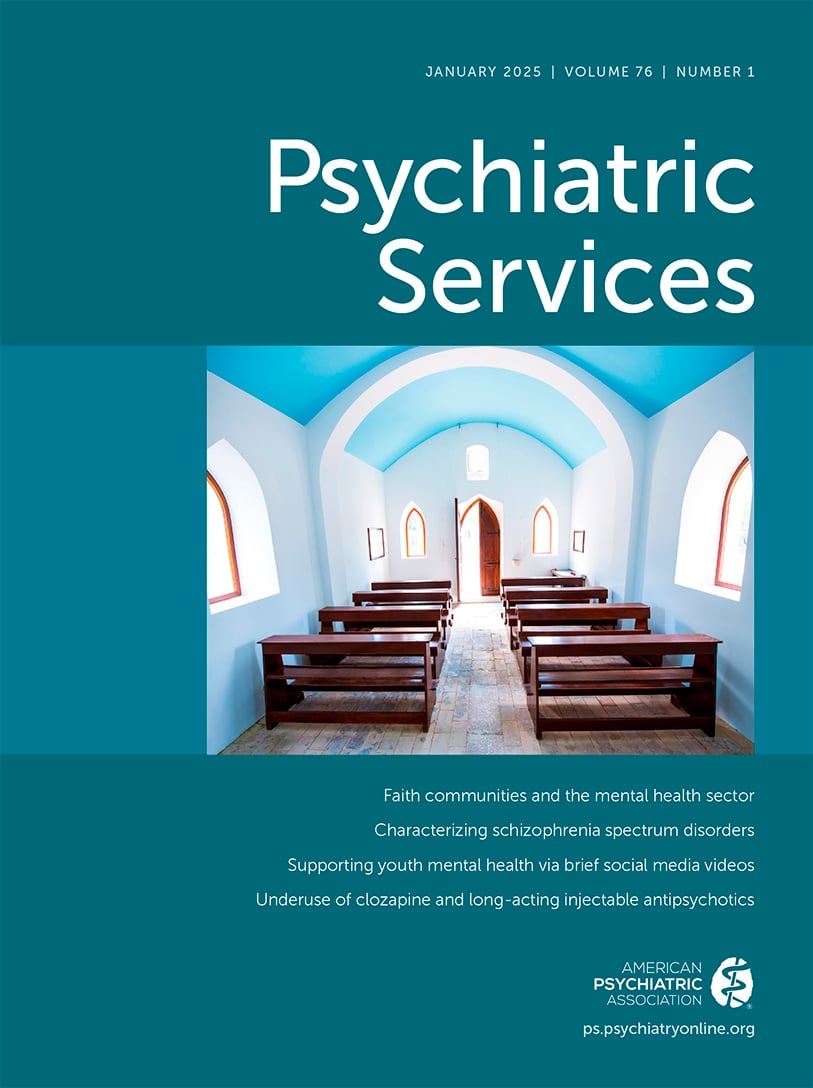Psychiatric Services
- Volume 43
- Number 6
- June 1992
Article
Publication date: 01 June 1992
Pages577–579Introduction by Dr. Bachrach: The idea that patients and former patients might themselves be involved in service delivery has become increasingly popular in recent years. Once viewed as an expression of patient protest without clinical merit, self-help ...
https://doi.org/10.1176/ps.43.6.577Publication date: 01 June 1992
Pages591–598Research on schizophrenia has suggested an association between relapse of patients and high expressed emotion (EE), defined as criticism, hostility, or emotional overinvolvement of at least one family member. In international studies, however, the ...
https://doi.org/10.1176/ps.43.6.591Publication date: 01 June 1992
Pages599–603Data from 9,055 adult intakes performed over two and a half years of a managed mental health care demonstration project in a large U.S. city were used as indirect measures of quality of care. The level of care to which patients were initially assigned was ...
https://doi.org/10.1176/ps.43.6.599Publication date: 01 June 1992
Pages603–607The shift to dangerousness-oriented civil commitment criteria has led to speculation that mentally ill persons who do not meet those criteria are being hospitalized under criminal commitment statutes. Using data on patients' psychiatric symptoms at ...
https://doi.org/10.1176/ps.43.6.603Publication date: 01 June 1992
Pages608–611Findings from a large-scale national study of clients admitted to publicly funded drug treatment programs between 1979 and 1981 were used to determine whether cocaine use by current and former methadone patients could be predicted. The sample for this ...
https://doi.org/10.1176/ps.43.6.608Publication date: 01 June 1992
Pages612–615An emergency psychiatry-mobile crisis program was established in 1987 in Charleston, South Carolina, linking professionals from the mental health center, the university, and the local police department. The program has two goals: to provide emergency ...
https://doi.org/10.1176/ps.43.6.612Publication date: 01 June 1992
Pages617–621Psychiatric emergencies faced by adolescents are often linked to developmental issues such as separating from parents, establishing attachments to peers, and developing autonomy. in a vulnerable adolescent, a stressful developmental event may trigger a ...
https://doi.org/10.1176/ps.43.6.617Publication date: 01 June 1992
Pages622–624Evaluation and treatment of the assaultive adolescent is an important but difficult process. From a psychodynamic perspective, the author reviews factors associated with adolescent violence, including alcohol and substance use, depression and suicidality, ...
https://doi.org/10.1176/ps.43.6.622Publication date: 01 June 1992
Pages625–629A family with an adolescent must transform itself from a predominantly nurturant unit to one that can tolerate and encourage the adolescent's need to separate. When an adolescent presents with symptoms that disrupt the developmental process, the clinician ...
https://doi.org/10.1176/ps.43.6.625Publication date: 01 June 1992
Pages630–633In 1990 the Robert Wood Johnson Foundation's Mental Health Services Program for Youth awarded grants to eight state-community partnerships to develop systems of care for mentally ill children and adolescents. The authors describe approaches to system ...
https://doi.org/10.1176/ps.43.6.630Publication date: 01 June 1992
Pages634–637A consensus that divorce constitutes a major disruption and disequilibrium in the lives of nearly all children is emerging. Reactions vary at different developmental stages. Divorce poses a very specific hazard to the normal adolescent process of ...
https://doi.org/10.1176/ps.43.6.634Publication date: 01 June 1992
Pages644–646Previous studies of detection of alcoholism by primary medical care-givers have found discovery rates to be at best 50 percent (2-6). In this study, mental health clinicians-in-training recognized alcohol-related symptoms in almost 70 percent of patients. ...
https://doi.org/10.1176/ps.43.6.644Past Issues
View Issues Archive
Vol. 76 | No. 1

Vol. 75 | No. 12

Vol. 75 | No. 11
